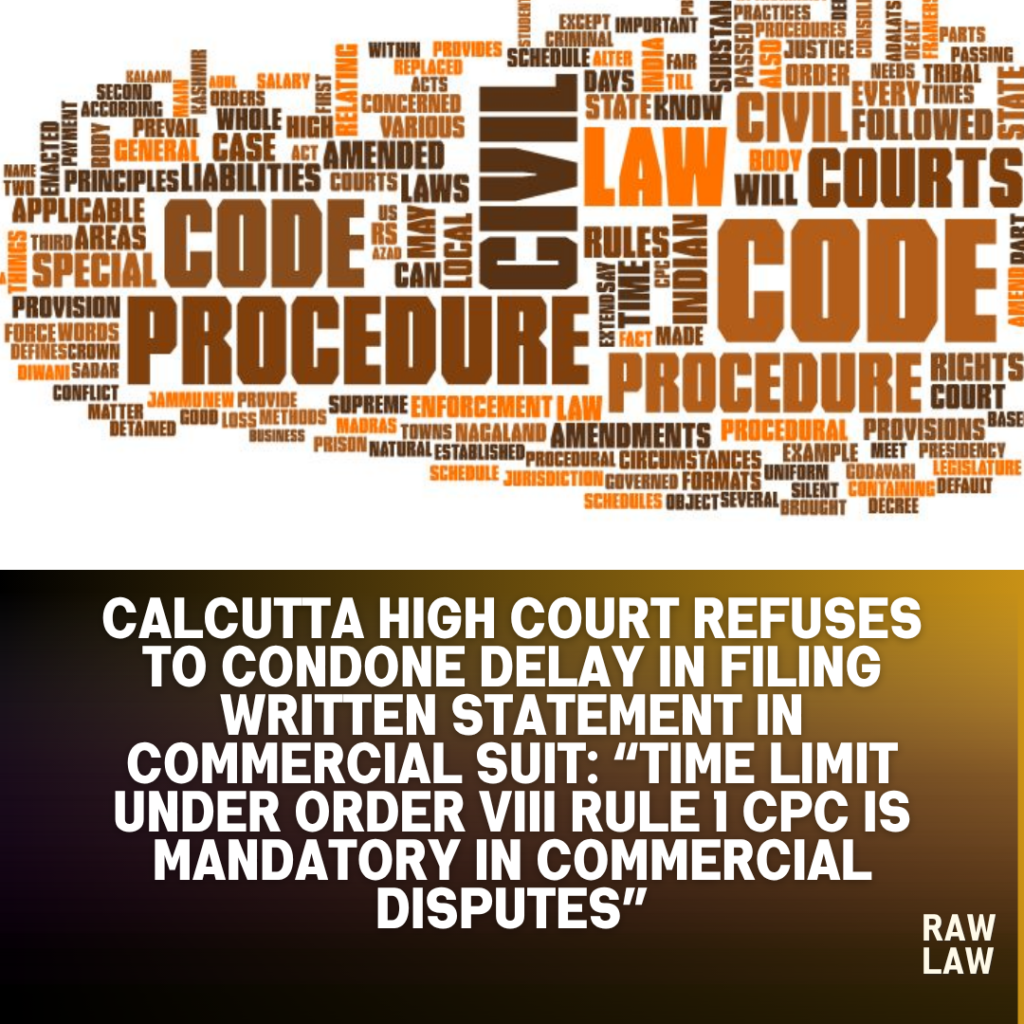Court’s Decision
The Calcutta High Court, Commercial Division, dismissed the defendant’s application seeking condonation of delay in filing the written statement beyond the 120-day period mandated under Order VIII Rule 1 of the Code of Civil Procedure, 1908 as applicable to commercial disputes. The Court emphasized:
“In view of the law laid down by the Hon’ble Apex Court, the time limit of 120 days from the date of receipt of summons in a commercial suit is mandatory and cannot be extended.”
Accordingly, the Court struck off the defendant’s right to file a written statement, stating that “no case has been made out for condonation of delay.”
Facts
The plaintiff filed a commercial suit for recovery of ₹20,66,558.04 for alleged supply of equipment. The writ of summons was served on the defendant on 12.12.2023. Despite the expiry of the 120-day statutory period (which ended on 10.04.2024), the defendant failed to file a written statement.
Subsequently, the defendant filed an application under Section 151 CPC seeking condonation of delay and leave to file the written statement. The defendant contended that the delay was unintentional and was caused by ongoing discussions for amicable settlement.
The plaintiff objected, arguing that the Commercial Courts Act, 2015 and Order VIII Rule 1 CPC bar the Court from accepting written statements beyond 120 days.
Issues
- Whether the Court has jurisdiction to condone the delay and accept a written statement filed beyond 120 days in a commercial suit?
- Whether the reason for the delay – pending settlement discussions – constitutes “sufficient cause”?
- Whether such a delay defeats the objective of the Commercial Courts Act to ensure speedy disposal of commercial cases?
Petitioner’s Arguments (Defendant)
The defendant submitted:
- That the delay was due to ongoing settlement discussions and not due to willful negligence or default.
- The Court retains inherent powers under Section 151 CPC to allow filing of the written statement in the interest of justice.
- Denying the opportunity to file a defence would cause irreparable prejudice and defeat the right to fair hearing.
- The defendant relied on precedents where some High Courts had taken a lenient approach in exceptional cases.
Respondent’s Arguments (Plaintiff)
The plaintiff argued:
- That the application is barred under the express provisions of Order VIII Rule 1 of the CPC (as amended by the Commercial Courts Act).
- The period of 120 days from receipt of summons is mandatory, not directory, in a commercial suit.
- The defendant was well aware of the legal requirement and consciously failed to comply.
- Allowing the application would defeat the purpose of speedy adjudication in commercial litigation.
Analysis of the Law
The Court examined the statutory language of Order V Rule 1 and Order VIII Rule 1 of CPC, as amended for commercial suits under the Commercial Courts Act, 2015. The amendments introduced strict timelines to expedite commercial litigation.
- Order V Rule 1(1): Service of summons to file a written statement.
- Order VIII Rule 1: Allows 30 days, extendable to 120 days, to file the written statement.
- Order VIII Rule 10: If the written statement is not filed within 120 days, the right is forfeited.
The Court emphasized that the legislative intent behind the amendment is to reduce procedural delays and promote certainty in commercial litigation.
Precedent Analysis
- SCG Contracts (India) Pvt. Ltd. v. K.S. Chamankar Infrastructure Pvt. Ltd., (2019) 12 SCC 210
– Applied. Held that courts have no discretion to allow filing of written statements beyond 120 days in commercial suits. - Desh Raj v. Balkishan (D) Through Proposed LRs, (2020) 2 SCC 708
– Distinguished. Though the Supreme Court permitted belated written statements in non-commercial suits, the Commercial Courts Act stands on a different footing. - M/s Fiem Industries Ltd. v. M/s Ravi Udyog, 2024 SCC OnLine Cal 231
– Followed. Calcutta High Court reiterated that “the Commercial Courts Act limits judicial discretion” in condoning delay beyond 120 days.
The Court also referred to the Statement of Objects and Reasons of the Commercial Courts Act, 2015, which stresses the need for efficiency and adherence to fixed timelines.
Court’s Reasoning
The Court found that:
- The summons was duly served on 12.12.2023.
- The 120-day period expired on 10.04.2024.
- The application for condonation was filed much later and no sufficient cause was shown for the delay.
The reason of “amicable settlement” was held to be vague, unsupported by any document or evidence, and incapable of overriding the express statutory bar.
“This Court has no jurisdiction to extend the time beyond 120 days as the same would be contrary to the legislative mandate and binding judicial precedents.”
Conclusion
The Court dismissed the application filed by the defendant under Section 151 CPC. The right to file written statement was struck off. The suit was directed to proceed on the basis of the pleadings on record.
Implications
This judgment reinforces the rigidity of procedural timelines in commercial litigation. The decision underscores:
- That the 120-day timeline under Order VIII Rule 1 in commercial suits is absolute and non-extendable.
- That parties must act with diligence and cannot take recourse to vague settlement discussions as an excuse for delay.
- That courts cannot invoke inherent powers under Section 151 CPC to override the express bar under the amended CPC provisions.
The ruling serves as a caution to litigants in commercial matters to strictly adhere to statutory deadlines.
Referred Cases and Their Relevance
- SCG Contracts v. K.S. Chamankar Infrastructure, (2019) 12 SCC 210
– Mandatory nature of 120-day deadline reaffirmed; no discretion to extend. - Desh Raj v. Balkishan, (2020) 2 SCC 708
– Distinguished; applied only to non-commercial suits. - M/s Fiem Industries Ltd. v. M/s Ravi Udyog, 2024 SCC OnLine Cal 231
– Followed to reinforce strict adherence to procedural timelines under Commercial Courts Act.



